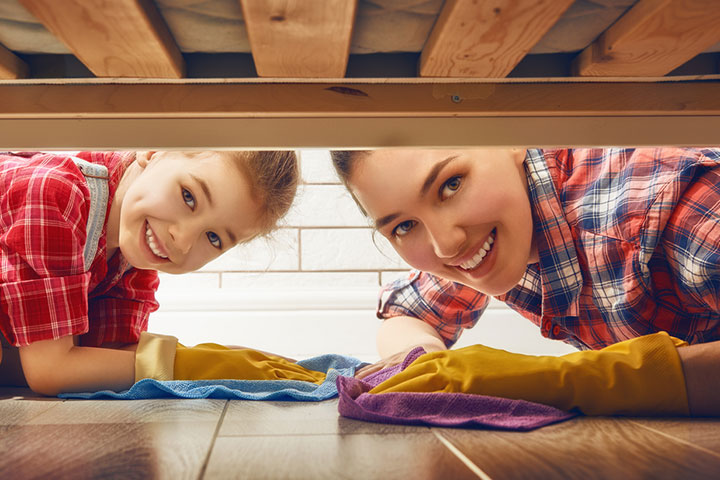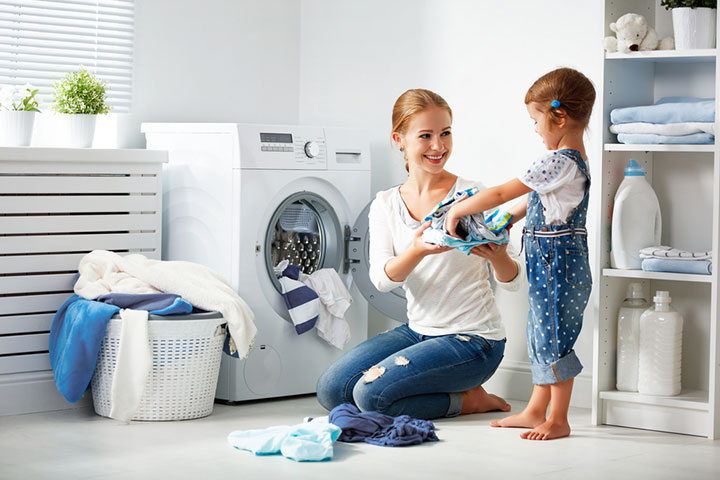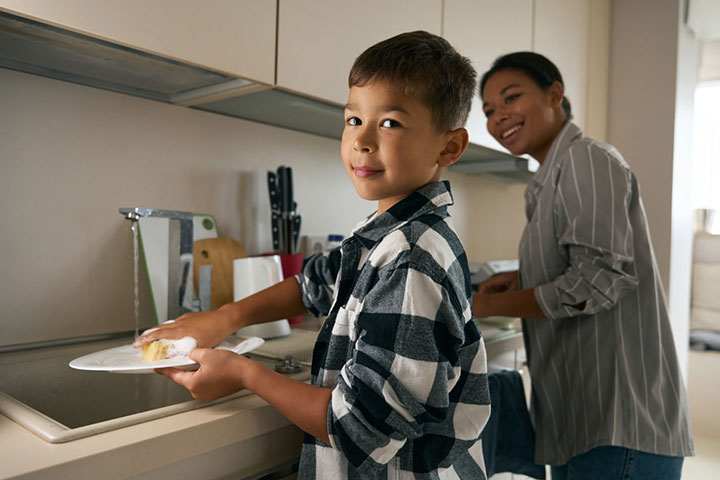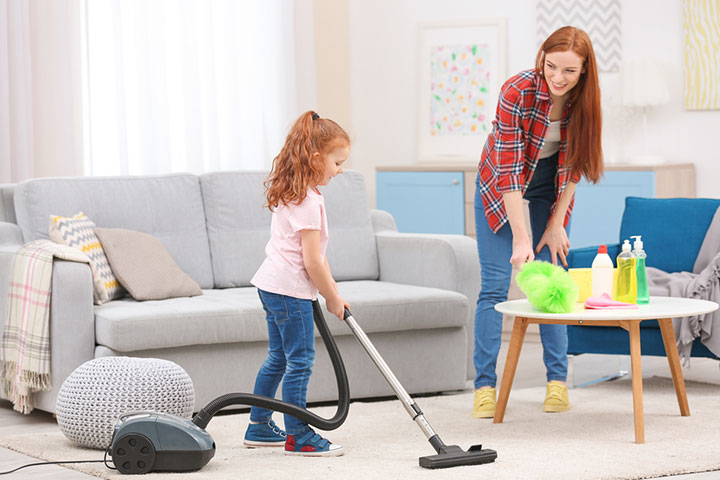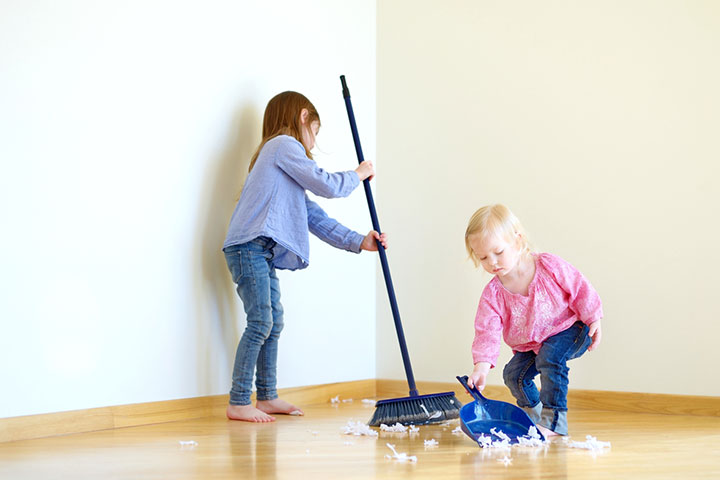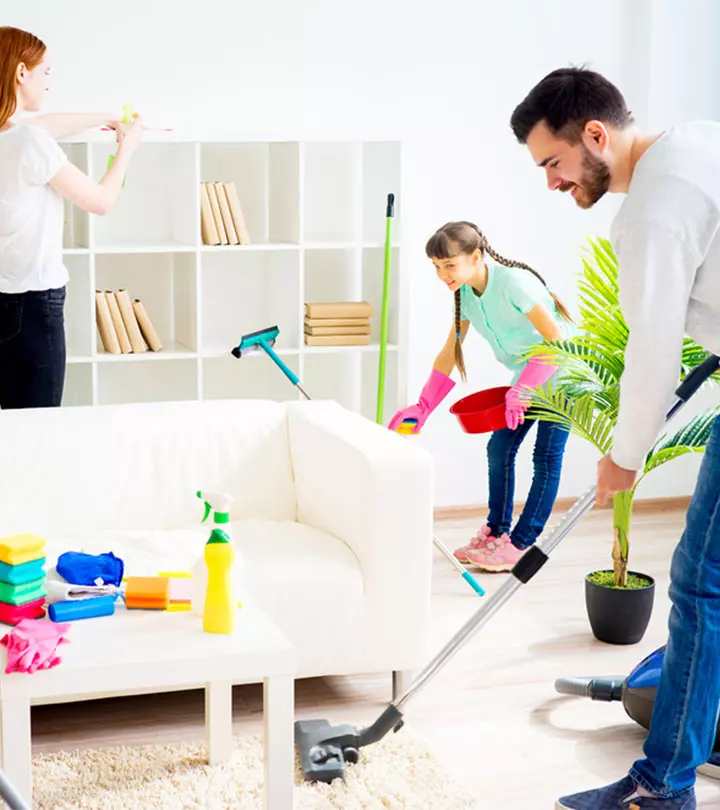
Image: Shutterstock
Teaching your child to clean can be a rewarding and valuable life lesson. It instills responsibility, organization, and a sense of accomplishment in them. However, it can also be a bit of a challenge, especially if your little one is more interested in playtime than tidying up. In this article, we’ll explore some tips and strategies to make the process of teaching your child to clean after themselves effective and enjoyable. From keeping it a positive experience to setting age-appropriate tasks, we’ve got you covered. Read on!
Try Not To Make It A Negative Experience
Image: Shutterstock
One way of teaching your child to clean is to keep the experience as positive as possible. While it’s tempting to scold or nag when toys are left strewn across the floor or dirty dishes pile up, this approach can backfire. Children are more likely to embrace cleaning when it’s associated with positivity rather than negativity. Here’s how to make it a positive experience:
1. Make It A Game
Turn cleaning into a game. Set a timer and see how many toys your child can pick up in a certain amount of time. You could even challenge them to beat their previous record.
2. Play Music
Put on some fun, upbeat music while cleaning. Dancing around and singing can make the task feel more like playtime.
3. Use Positive Language
Instead of saying, “You need to clean up this mess,” try saying, “Let’s see who can clean up the fastest!”
4. Celebrate Achievements
When your child finishes a cleaning task, celebrate their achievement with praise or a small reward, like a sticker on a chore chart.
Create An Incentive
Image: Shutterstock
Incentives can be powerful motivators when teaching your child to clean. While it’s essential to encourage intrinsic motivation, external rewards can serve as stepping stones toward cultivating a sense of responsibility. Here are some ideas:
1. Reward System
Create a reward system where your child earns points or tokens for each cleaning task completed. Once they accumulate a certain number, they can redeem them for a special treat or privilege.
2. Special Outings
Offer a fun outing or trip to the park as a reward for a job well done. Let them know that after cleaning up, there’s something exciting to look forward to.
3. Extra Playtime
Grant your child some extra playtime after they’ve finished cleaning. This way, they’ll associate cleaning with more time for their favorite activities.
4. Small Surprises
Keep a stash of small surprises or treats that your child can choose from once they’ve completed their cleaning tasks.
Cleaning Shouldn’t Be A Punishment
Image: Shutterstock
Avoid using cleaning as a form of punishment. It’s important that your child doesn’t associate cleaning with negative emotions. If you use cleaning as a consequence for misbehavior, they may grow to resent it. Instead, address behavior issues separately and focus on teaching cleaning as a valuable life skill.
1. Separate Consequences
If your child misbehaves, address the behavior issue directly, such as a timeout or a discussion about the problem. Don’t use cleaning as a punishment for unrelated issues.
2. Explain The Value
Emphasize the importance of cleaning as a way to take care of their belongings and home, rather than making it a chore they’re forced to do.
Make Sure Tasks Are Age-Appropriate
Image: Shutterstock
Teaching your child to clean effectively means providing age-appropriate tasks. Expecting a young child to tackle complex cleaning chores may lead to frustration and discouragement. Here’s a general guideline for age-appropriate tasks:
1. Toddlers (Ages 1-3)
At this age, children can start by learning to put away their toys and help with simple tasks like dusting low surfaces or carrying dirty laundry to the hamper.
2. Preschoolers (Ages 3-5)
Preschoolers can handle more responsibilities, such as making their bed, setting the table with supervision, and helping to wipe down surfaces.
3. Early Elementary (Ages 6-8)
Children in this age group can handle more complex chores, like cleaning up their room, vacuuming, and doing basic laundry tasks.
4. Preteens And Teens (Ages 9 And Up)
As your child gets older, they can take on more responsibility, including cleaning the kitchen, bathrooms, and doing their own laundry.
Set A Good Example
Image: Shutterstock
Children often learn by imitation. If they see you taking pride in a clean and organized environment, they’re more likely to embrace the habit of cleaning. Here’s how you can set a good example:
1. Clean Together
Dedicate some cleaning time to bond with your child. Cleaning together can be a fun and educational experience.
2. Share Your Routine
Explain your cleaning routine to your child. Discuss why you clean certain areas regularly and the benefits of a clean and organized space.
3. Use Positive Language
When discussing cleaning, use positive language and express how it makes you feel good to have a clean home.
Teaching your child to clean is a valuable life skill that can be both fun and rewarding. By following these tricks, you can help your child develop a sense of responsibility and a lifelong habit of maintaining a clean and organized environment. So, let’s make cleaning an enjoyable and educational journey for both you and your child!

